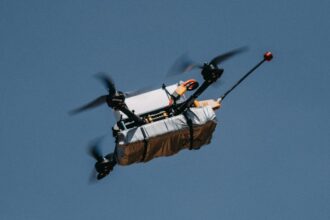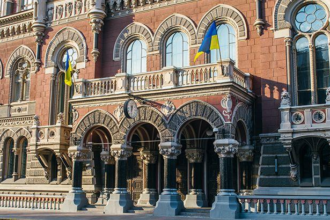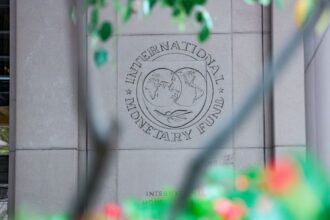Conversations in Tyre, in the southern Lebanon, are now hurried. It is not a good idea to linger in the streets. There are fewer and less people to talk to.
The rumble of Israeli air raids or the sound of Hezbollah’s rockets can cut off a conversation.
Israeli drones buzz overhead.
You drive fast but you don‘t overspeed, because you know there are eyes above. You are often the only vehicle on an empty road, which makes you a target.
This knowledge is always with you, just like the body armor we wear.
Many Lebanese have no roofs over their heads, and there is no armor plating to protect them. According to Prime Minister Najib Mikati, more than one million people have been forced out.
The war has left a vacuum in this ancient city, proud of its Roman ruins and golden sandy beaches.
The streets are deserted and the shops closed. The beach is deserted. Israeli air strikes rattle the windows.
After receiving a warning by Israel, the local civil defence headquarters was abandoned. Rescue teams were forced to leave.
Israeli strikes are becoming louder and closer. In recent days, several strikes on hills opposite us seem to have involved some of Israel’s largest bombs, weighing over 1000lb.
Then there is Hezbollah. While the armed group tries to repel Israeli troops from invading Lebanese territory, it controls the international media in Tyre. It controls our movements but does not control what we write or broadcast.
In hospitals, doctors appear exhausted and overwhelmed. Many doctors no longer travel home because it’s too dangerous.
Instead, they care for patients like Mariam, who is nine years old and has her left leg in a cast. Her arm is also heavily bandaged. She is sleeping in a hospital bed with dark hair framing the face.
“She came as part of a nine-person family,” said Dr Salman Aiibi, CEO of the hospital.
“Five others were also treated.” Mariam is doing much, much better after the operation. We hope to send Mariam home today. “This hospital is the frontline, so most casualties are treated here and stabilized before being sent to another centre.
He says that the hospital receives 30-35 women and children injured each day. This is taking a toll on the staff.
He said, “We must be positive when we work.” “When we stop to think, that’s the time when we get emotional.”
When asked about the future, his response is a sigh. He says, “We are in war.” “A destructive war against Lebanon.” We hope for peace but are prepared for any eventuality.”
Hassan Manna is also prepared for the worst. He is staying in Tyre, as the war tightens. He is still open for business in the small coffee shop that he has been running for the last 14 years. Locals still stop by to chat and get reassurance from the small plastic cups filled with sweet coffee.
Hassan said, “I won’t leave my country.” Hassan told me, “I won’t be leaving my home.” I’m staying at home with my family. I don’t fear them (the Israelis).
“The whole world has come out to the streets.” We don’t wish to be humiliated in such a way.
“Let me die in my house.”
Last weekend, an Israeli air strike killed five of his neighbours in their home. Hassan was thrown into the air by two incoming Israeli rockets.
He was able to walk away with only an arm injury.
Was Hezbollah a target? We don’t. Hassan claims that the dead were civilians, members of a family and included two women and a child.
Israel claims that its targets are Hezbollah militants and their infrastructure, not the people of Lebanon. Many people here, including doctors and witnesses such as Hassan, say the opposite.
Israel claims it is taking steps in order to minimize the risk of harming civilians and accuses Hezbollah hiding its infrastructure among civilian population.
Hassan insisted, “There were no weapons there.” “If there were weapons, we would have fled the area. There was nothing to bomb. The woman was 75.”
He dug through the rubble to find survivors, until he fell and was taken to the hospital.
When he speaks about his neighbours, his voice breaks into anger and grief and his eyes fill up with tears.
He said “It is unjust, totally unjust.” We know the people. They were born in this country. “I swear I wish I’d died with them.”
Ten days ago we saw the view from a Christian area near the border.
One local woman, who asked to remain anonymous, told me that everyone was on edge.
“The phone is constantly ringing,” she said. “We never know when an attack (by Israel) will come. It’s always tense. “We can’t sleep many nights.”
We were interrupted by an Israeli air strike that sent smoke rising up from distant hills.
She listed a number of villages that were nearer to the border, now deserted or destroyed following the tit-for-tat exchanges between Hezbollah & Israel over the past year.
She said that the damage in these regions was already much greater than the five-week conflict of 2006. She said that if people wanted to return later, there were no houses left.
“There is no house where there aren’t relatives,” she said. “Either near or far.” All the men are Hezbollah.”
She told me that before the war, the armed group “bragged about its weapons and said it would fight Israel for ever.” “Privately even their followers are shocked at the quality of and quantity of attacks from Israel.”
Few would dare guess the future. “We’ve entered a tunnel,” said she, “and we can’t see the light yet.”
No one knows what will happen next in the Middle East, from Tel Aviv to Washington to Tehran.
Mohamed Madi: Additional Reporting
Read More @ www.bbc.com




